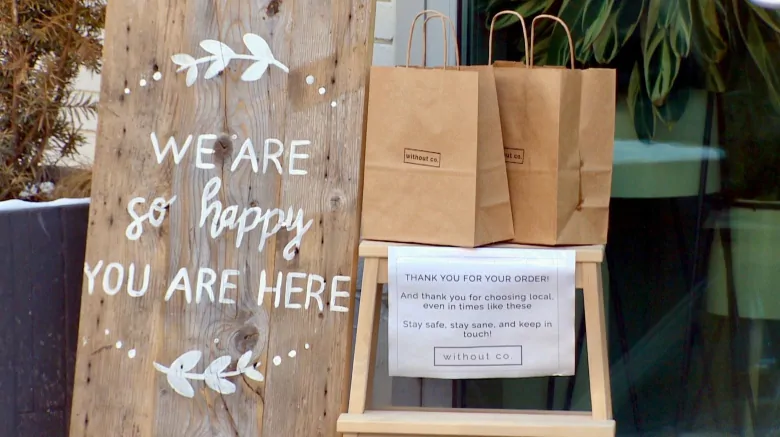Shop owners frantically launch online stores to stay open during pandemic

For a few years, Theresa Ransom has wanted to venture into online sales for her Calgary gift boutique, but could never find the time.
Now, with the pandemic shutting down most retail stores across the country, including her own, she’s invested many late nights in launching online shopping on her web site. The process of bringing her store, Kala & Lime, online hasn’t been easy. Even with the physical shop closed, time is in short supply.
“The hours are pretty crazy,” said Ransom, who has three children under the age of nine.
“We’re also doing homeschooling all day and keeping them active and entertained. We also work on the store and my husband works full-time. We’re filling orders and getting product online every night.”
The last several weeks have been “chaotic” and “frantic,” she said, but the hard work is beginning to pay off. Kala & Lime, which specializes in items like candles, bath accessories and confectionery items, is still in business. And she said the response from customers has been “amazing.”
She hopes it will continue as they make more products available, such as home decor, jewelry and fragrances.
“We’ve been working tirelessly and we maybe have one-five-hundredth of all our product [online],” said Ransom. “Lots of late nights. We haven’t been to bed before midnight in, honestly, as long as this started.”
Many shops across the country are rushing to offer online sales or expand their available product line to keep their businesses afloat and meet customer demand.
Getting creative with the web
Ottawa-based Shopify, an e-commerce platform that helps entrepreneurs do business online, had more than one million merchants subscribed to its service before the pandemic and has seen increased demand for its service.
The company could not provide statistics for Canada, but around the world, online store creations jumped by 75 per cent when comparing the second week of April to the first week in March, likely due to brick-and-mortar businesses moving online, according to the company.
Some entrepreneurs have to get creative to offer the same product or service online as they did in-store.
Six months before the pandemic began to spread, Michelle Fentiman opened a Calgary refillery shop called Without Co. Her business model was focused on customers going to her store and filling their bottles and containers with products like hand soap, shampoo and lotion.
Her shop adheres to a zero-waste motto, which is the opposite of what online shopping is known for — an immense amount of cardboard and plastic packaging.
Now that her storefront is closed, Fentiman fills her trunk with supplies and brings the products to her customers directly, making her refillery mobile.
Part of that is picking up containers people want refilled. She sanitizes the containers people leave on their doorstep before filling them up with products like laundry detergent and hand soap. The bottles are sanitized again after she drops them off for the customer on their front step.
Despite the long hours and physical work, Fentiman said her sales are up about 15 per cent so far.
“It’s just been go, go, go, fulfilling orders and delivering orders,” she said. “Everyone really needs hand soap and everyone really needs lotion right now because of sanitizer. So it’s been busy, seven days a week, but I’m happy where things are at, for sure.”
The challenge of e-commerce
Creating an online store is often challenging for small businesses, even when subscribing to an e-commerce platform like Shopify, because of the many steps it can take — such as photographing products and writing up titles and descriptions. Considering how many products some shops sell, it can be a tedious process.
“It’s definitely work, but it’s important work right now. Really, if you’re not online, you’re not making any money,” said Fentiman.

With no more sit-down service, many restaurants now offer delivery, takeout and curb-side pickup. A few have even started selling groceries, including Community Flatbread Company, located in the bedroom community of Cochrane, northwest of Calgary.
Owner Rob Filby came up with the idea after talking with his food supplier about how so many people were packing into grocery stores when the pandemic began.
Every Monday, Firby creates a grocery order form including meat and produce. On Wednesdays, he places a bulk order, which arrives the following day. Firby, his chef and manager then organize the food and deliver it to doorsteps on Fridays.
“We’ve tried to keep everything as cheap as possible. Our biggest goal is to keep people out of the supermarkets,” he said during an interview on CBC Radio’s The Calgary Eyeopener.
“If we can offer this at supermarket prices, people are going to jump on it a little more.”
His restaurant may be closed but, like many entrepreneurs, the bills keep coming in. Filby said that with this new temporary venture, he’s able to at least generate a bit of revenue until the pandemic is over.





